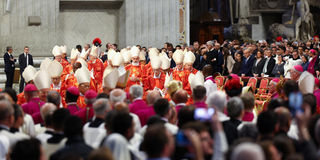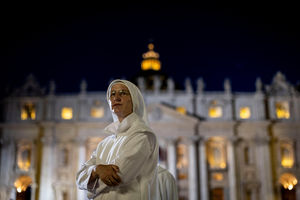
Cardinals attend the Holy Mass, celebrated for the election of the new pope, presided over by the Dean of the College of Cardinals, Cardinal Giovanni Battista Re, in St. Peter’s Basilica, at the Vatican, May 7, 2025.
The conclave to elect the next Pope began yesterday, following Pope Francis’s death on April 21. For no particular reason, this triggered a thought: Is the conclave more democratic than the election of an African president? A dive into the Vatican’s electoral rituals offered some enlightening (and sobering) comparisons.
As of yesterday, 133 cardinals under the age of 80 were eligible and expected to vote in the conclave. This conclave is the most geographically diverse in Church history, with cardinals from 71 countries gathered in the Sistine Chapel. The winner must secure at least 89 votes—a two-thirds majority.
There’s the first major difference. No African presidential election requires a two-thirds majority to win. The papal election, though exclusive, is structured, transparent, and merit-based—more than can be said for some “secular” elections on our beloved continent.
In our elections, the electorate is very elastic (depending on how greedy those who count the votes or stuff the ballot boxes are), so you can have situations where there are 100,000 registered voters, but dead voters resurrect for the day, and you end up with 125,000 people voting.
The Vatican won’t suddenly find 27 extra cardinals materialising. African electoral commissions, however, are known to discover bonus voters after polls close. Zimbabwe’s 2023 vote and Uganda’s 2021 election both reeked of irregularities—from ballot stuffing to internet blackouts.
Conclave voting
Conclave voting happens in cloistered silence, with no campaign money sloshing about, no billboard lies, and no armed thugs in pickup trucks. Cardinals don’t have to hand out bags of rice or mobile money to get votes. African presidential hopefuls, on the other hand, run campaigns powered by patronage, police batons, or foreign dollars—sometimes all three.
Cardinals are appointed (granted), but they’re chosen for theological brains or bureaucratic muscle. That gives us an informed electorate. Meanwhile, African presidential hopefuls are often judged by ethnicity, wallet size, or whose womb they emerged from (read: sons of former presidents). In Nigeria’s 2023 elections, voters didn’t pick candidates so much as to auction their votes to the highest bidder.
The two-thirds rule forces cardinals to seek consensus—rarely the case in African winner-takes-all contests that inflame ethnic passions. Look around, there is no shortage of examples.
The conclave loses points on inclusivity. It’s a male-only club of supposed celibates. No women, no laity, not even the altar boys get a say. African elections, flawed as they are, at least allow most adults to cast a ballot. Yet, what’s the use of universal suffrage when incumbents bend institutions to their will?
The election of the Pope is like the Tanzanian presidential vote; the losing candidate cannot appeal the result. The process is considered divinely guided and final. Votes are burned after each round, signal jammers prevent leaks, and no campaign trail means no posters to tear down or rallies to gas. Compare that with Africa, where, even after the vote, the real war begins—through courts, street protests, and, occasionally, exile. African courts have had moments of glory—Kenya in 2017, and Malawi in 2020—but these are exceptions that prove the rule. More often, the courts are regime cheerleaders in robes.
No pope-elect of the modern era has ever had to flee into exile. Opposition candidates in Africa can’t say the same. After Zimbabwe’s 2018 election, Nelson Chamisa went underground. In 2021, Uganda’s Bobi Wine found himself barricaded at home. Another Ugandan opposition figure, Dr Kizza Besigye, has been in jail since last November. In Tanzania, opposition leader Tundu Lissu was jailed and charged with treason—for daring to ask for electoral reforms.
Wild affairs
Yet things weren’t always so genteel in Rome. Before the conclave rules were formalised in the 13th century, papal elections were wild affairs. After Pope Clement V died in 1314, Italian and French cardinals turned violent. Supporters of the French candidate burned the meeting hall down. Italians fled. The election stalled for two years before Pope John XXII was finally chosen—in Lyon, not Rome. In 1378, a Roman mob demanded an Italian pope. Cardinals, fearing for their necks, elected Urban VI. Later, they claimed coercion and chose a rival, Clement VII. The result? Two popes and a schism. To end the chaos, the Council of Constance stepped in and elected Pope Martin V.
The Viterbo Conclave (1268–1271) went on for so long that the townspeople locked the cardinals in, took off the roof, and cut off their food supply. Eventually, Gregory X was elected. Hunger works.
Over the centuries, the conclave evolved. By the 16th century, it was all incense and order. But not without scandal. In 1517, Cardinal Petrucci plotted to kill Pope Leo X and was executed for his troubles. During the infamous “Cadaver Synod” of 897, Pope Stephen VI dragged the rotting corpse of Pope Formosus into court to try him. He later ended up strangled in prison.
All has been quiet for more than 500 years in papal elections. The conclave’s secrecy, the Church’s authority, and the elite status of cardinals have historically protected losing candidates from such fates, unlike the more volatile outcomes in some African presidential elections.
The author is a journalist, writer and curator of the "Wall of Great Africans". X@cobbo3







